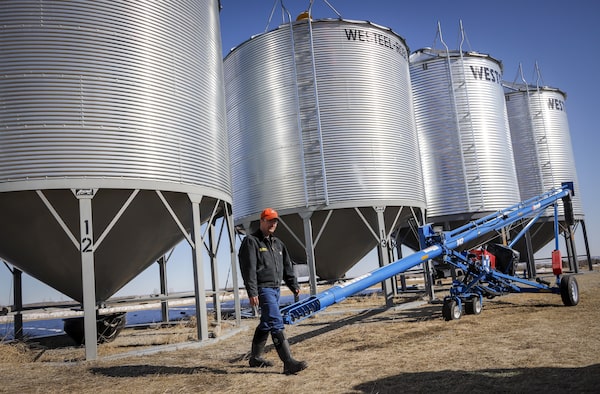
Canada’s exports of canola are down more than 30 per cent through the first four months of the year, mainly due to the closure of the Chinese market.Jeff McIntosh/The Canadian Press
Depending on who’s talking, Canada’s farm export sector is either on the cusp of greatness or headed for disaster.
Export Development Canada, the federal government’s export lender, issued a surprisingly sunny report this month identifying agriculture as “a bright spot for trade” and predicting “greener pastures” ahead for Canadian farmers. It’s forecasting that food and agricultural exports will grow 4 per cent this year to $66-billion after a flat 2018.
But it’s hard to reconcile this glass-half-full narrative with the recent run of bad news down on the farm.
There is China’s indefinite ban on Canadian canola seed imports and restrictions on various other products. Prices for many farm commodities have slumped badly since last year as the U.S.-China trade feud roils global markets. Meanwhile, demand for animal feed in China has collapsed as it slaughters millions of pigs to halt an outbreak of African Swine Fever.
Veteran agricultural economists Al Mussell and Douglas Hedley of Agri-Food Economic Systems look at that landscape and see a world of hurt for Canadians farmers amid rising protectionism and uncertainty across numerous markets.
“The situation confronting Canadian agri-food looks increasingly ominous,” they write in a new report, Global Trade Policy in Disarray.
The two economists characterize the swine fever outbreak in China as a “generational event” that could depress Chinese imports and prices of oilseeds, such as canola and soybeans, possibly for years. That’s unfortunate for Canada because China has been a lucrative and growing market for Canadian canola, worth more than $4-billion last year. Farmers may not get it all back, even if China lifts the ban.
The giants of global trade are throwing their weight around, and smaller players such as Canada are getting hammered.
China halted imports after finding what it says were weeds in recent Canadian shipments. Ottawa, however, fears it’s retribution for the detention of top Huawei executive Meng Wanzhou. Canada’s exports of canola are down more than 30 per cent through the first four months of the year, mainly due to the closure of the Chinese market.
The livelihoods of farmers are also getting squeezed. Net farm incomes tumbled more than 20 per cent to $11.6-billion in 2018 from 2017, according to Statistics Canada.
One of the perverse effects of the U.S.-China trade war is that Washington is once again massively subsidizing its farmers to offset Chinese tariffs – US$12-billion last year and another US$16-billion this year. This is leading to overproduction of some crops and depressing already weakening global prices.
The U.S. has committed to limiting farm subsidies to US$19-billion a year under a World Trade Organization deal. But Mr. Mussell and Mr. Hedley worry U.S. President Donald Trump may not see those limits as “an important constraint” as its trade war with China escalates.
Subsidies, however, may be the least of the worries facing Canadian farmers. The assault by the Trump administration on the WTO and the global trading order is particularly dangerous for agricultural exporters such as Canada, which is a big beneficiary of freer and rules-based trade.
“The worrying prospect that rules-based trade could somehow begin to erode or unravel, confronts a Canadian agri-food sector vulnerable to changes in international trade conditions,” according to Mr. Mussell and Mr. Hedley.
Agriculture has always been an area of trade prone to protectionism, and disputes. WTO rules defuse conflicts and bring some order to the chaos by creating clear rules about what’s allowed, and what’s not.
The WTO’s entire dispute settlement system could soon grind to a halt because the U.S. has been blocking the appointment of panelists to the appeals tribunal. By December, there won’t be enough panelists to hear a case.
The greater danger is that a diminished WTO allows dominant countries such as the U.S. and China to increasingly set their own rules and throw their weight around.
That’s not a game that Canada can play. It doesn’t have the clout to set its own prices or effectively counter spreading protectionism.
“Canada should expect greater difficulty exporting and importing products in the future,” Mr. Mussell and Mr. Hedley conclude. “This is especially the case for agri-food products as they are commonly the most targeted products of trade disputes.”
Food and agriculture should be a bright spot for exports. But global trade is evolving, and not in ways that are good for Canada.
It’s hard to see how anyone could look at the trade landscape and see greener pastures.